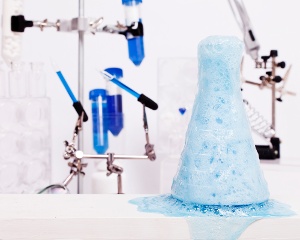Epoxy is long-lasting and durable, making it a high-quality material used in various ways for the manufacturing, installation and repair of solid surface countertops.
Waterproof with excellent resistance to chemicals and abrasions, epoxy can be used to:
- Create a durable countertop for harsh environments
- Bond countertops for added strength
- Repair cracks in solid surface countertops
A Durable Countertop For Harsh Environments
Epoxy resin countertops are one of the most durable countertops on the market today. That’s why they are often found in harsh environments like laboratories, biological science facilities and industrial testing spaces.
often found in harsh environments like laboratories, biological science facilities and industrial testing spaces.
Epoxy resin countertops are made from a mixture of materials that are then cured as a solid continuous product. These materials primarily include epoxy resin and silica, but also typically include a hardener and a filler.
During the manufacturing process, epoxy resin materials are molded and oven cured. The heat permanently sets the material into a solid slab. Manufacturers can modify the properties of the mixture to create customizations like color.
It’s important to note that while epoxy is a term you may hear or see online when referring to do-it-yourself projects, there is a significant difference between laboratory-grade epoxy resin and epoxy resin used for home or craft projects. If you operate in an environment where your lab countertops must withstand harsh conditions, it is critical to ensure that any epoxy resin product you buy is tested for your industry’s best practices.
What are some of these harsh conditions that an industrial workbench commercial grade countertop can withstand? Here are some advantages epoxy resin offers:
- High bacterial resistance
- High fungal resistance
- High corrosion resistance
- High chemical resistance
- High water and moisture resistance
- High scratch resistance
- Continuous heat exposure above 350 degrees F
- Flame retardant
- Holds up to impact and stress fractures
Are there any disadvantages to using epoxy resin as your choice of solid surface countertop? While this material offers many benefits, its cost is one of the biggest disadvantages. It’s not unheard of for epoxy resin countertops to cost as much as $100 to $200 per square foot, not including any specifications that you require.
An alternative you might consider is a phenolic resin countertop. This popular material maintains 90% of the characteristics of epoxy resin at a fraction of the price. You can read more about this option in our article, Phenolic Vs. Epoxy Resin Work Surface | Which One Is Best?
Bond Countertops For Added Strength
Epoxy also makes a great adhesive when bonding countertops to substrates. During solid surface countertops installation, there are a variety of adhesives that can be used, from silicon to even hot melt glue guns.
Epoxy for solid surface countertops is commonly used during installation because it creates a strong bond and has excellent resistance to water, inorganic acids and most organic solvents. Epoxy also cures fairly quickly. Within just a few minutes it reaches handling cure, and it is fully cured within 24 hours.
You can also use epoxy to bond pieces of solid surface countertops together. You may need to mix in drops of paint in coordinating colors if your epoxy filler doesn’t perfectly match your solid surface countertop.
The best solid surface countertops manufacturers will work with you to determine the best bonding agents when installing your surfaces so that you can ensure they are prepped and ready to go in your workspace.
Repair Cracks In Solid Surface Countertops
Although solid surface countertops are durable thanks to how they are constructed, accidents happen. The good news is that if a crack occurs, solid surface can easily be repaired using epoxy.
good news is that if a crack occurs, solid surface can easily be repaired using epoxy.
While epoxy resin is one of three types of solid surface countertops because of how it is constructed into a solid continuous product, you may have heard of solid surface and wondered the difference.
Solid surface countertops contain a non-porous, homogeneous material with the same composition throughout. They are made from a resin and feature a filler material, with the end result around 66% minerals and 33% binding resins. Resin material can vary from acrylic to polyester and plastic. The mineral portion typically includes aluminum trihydrate (ath). Manufacturers can customize a solid surface countertop to a specific size and shape, as well as create special looks that mimic quartz, granite or another natural stone.
If a crack occurs, it’s important to address it right away. One method for repair is to use solid surface material repairing epoxy to fill in any cracks. Make sure you work in a well-ventilated area since even small amounts of epoxy fillers can give off fumes.
While you should read the directions on the epoxy filler product label, here is how you typically repair a crack:
- Clean the crack before applying the epoxy filler using denatured alcohol and a toothbrush.
- If the epoxy filler color doesn’t perfectly match your solid surface countertop, you can mix in drops of paint in coordinating colors.
- Follow the manufacturer’s instructions for blending the epoxy filler with a hardener.
- Apply the epoxy filler to the crack. Clean off any excess, but leave the filler slightly protruding above the surface of the crack.
- Let dry (usually 24 hours).
- Once the epoxy hardens, you will need to sand the area, first using 120-grit paper and working up to using 400-grit paper. Ultra-fine Scotch-Brite pads can finish the product.
You can read more about how to repair your solid surface countertops in our article, Solid Surface Countertop Repair And Prevention Tips.
Important note: While this information above can help you with solid surface countertops repair efforts, it's important that you check with the manufacturer of your work surface for instructions that may be applicable to your specific product. Special finishes or designs may call for different repair methods.


